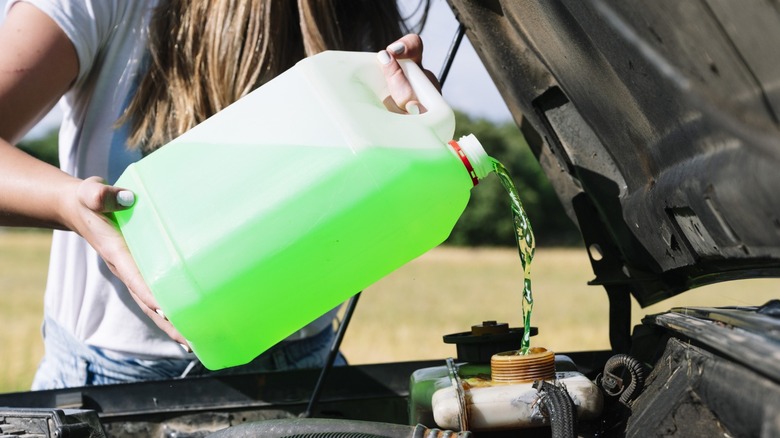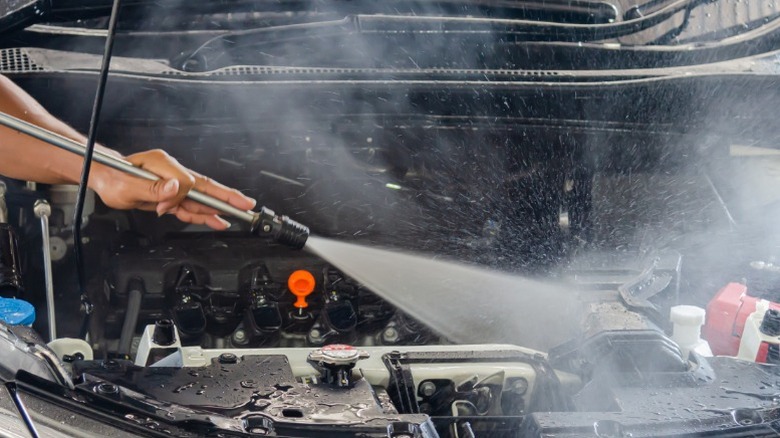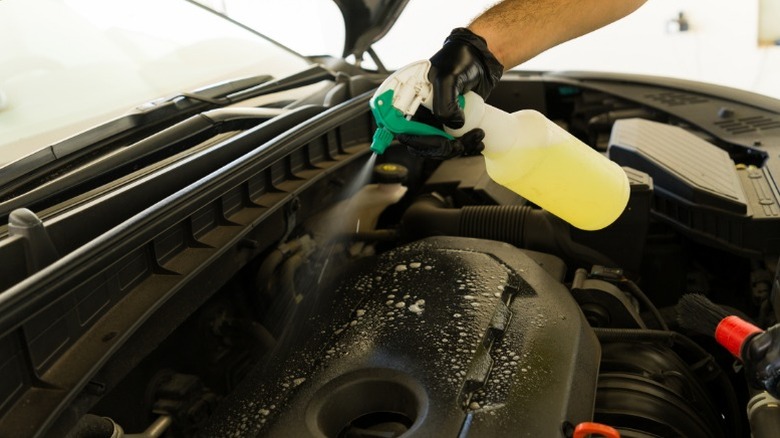What Happens If You Spill Coolant On An Engine? (And How To Clean It)
If you've ever been topping off your car's coolant and accidentally poured the brightly colored liquid all over the engine, you understand that it can be both frustrating and concerning. Coolant is sticky, and when it dries, it turns into a crystallized form that can be difficult to remove. If you've accidentally spilled coolant on your engine and are freaking out, don't worry. As long as you don't leave the mess for a really long time — like, weeks or months — you most likely won't do any serious damage to your engine or the surrounding components.
As a former professional mechanic and a lifelong car fanatic, I've spilled my share of automotive fluids. I know that it can be scary to spill some of those liquids, and for good reason, too. Many automotive fluids contain caustic or toxic chemicals. Some of them can damage your skin or your car's paint, while others smell absolutely awful and will stain and ruin clothes. While coolant itself is pretty toxic if ingested, and it's not great for your car's paint, spilling it on your engine shouldn't do any real damage as long as you clean it quickly. If you're curious about how to clean your engine after a coolant spill, stick around. I'll break it down for you in easy terms, and we'll even go into a little deeper detail to explain why it's important to clean up after auto fluid spills and what could happen if you don't.
How to clean coolant off your engine
I mentioned that it's relatively easy to clean coolant off your car's engine. That's because coolant is water-soluble, meaning it's easy to remove using a garden hose or even a pressure washer. For small spills, you can simply wipe the area up using a little water and a shop rag or some paper towels. But what if you spilled an entire jug of coolant on your engine, and it's made its way into all the cracks and crevices? In that case, you'll probably want to use something like a hose or pressure washer.
It is safe to use a pressure washer on your engine. You need to be careful, though. Don't be too rough around hoses and belts, and try to avoid spraying electronic sensors and wires directly or for sustained periods. Focus on the areas covered in coolant. They'll be easy to see because coolant is usually a bright color. Because it dissolves in water, it won't take a lot of effort to wash it off your engine, so don't go overboard and flood any sensitive components.
If you're interested in going a little bit farther, there are some tips you can use to keep your engine bay showroom clean. Making a little extra effort to ensure that your engine is super clean isn't just important after a spill — it's also a great way to learn more about your car's motor and, if it's always clean, it will be very easy to notice any leaks or broken parts.
Why it's important to clean up automotive fluid spills
You may be wondering why it's important to clean up automotive fluid spills at all. Sure, if they're on the car's paint or your skin or something, then maybe it's a good idea to clean them up. But inside the engine bay, where the fluids are supposed to be anyway — surely it's okay to leave them for at least a little while, right? There are actually quite a few reasons why you should clean up automotive fluid spills as soon as they occur, even in the engine bay. Let me explain.
I've already covered this briefly, but many automotive fluids are extremely harmful, either to you or other parts of your car. For example, ethylene glycol, one of the main chemicals in coolant, is extremely toxic when ingested. That's also why it's so important to store automotive fluids safely — you don't want your small child or pet accidentally eating or drinking these things.
Other chemicals in coolant can cause mechanical components to degrade or corrode over time if you don't clean up spills and messes. Brake fluid is another extremely harmful chemical that can cause skin irritation, strip the paint off your car, and damage rubber components like hoses or belts. Other fluids, like engine oil, may not burn your skin — unless you try changing the oil while the motor is hot — but can cause grime buildup in your engine bay, which can lead to other problems. Basically, if you spill an automotive fluid, clean it up. It won't take you too long if you use the right degreasing products, and doing so can help prevent a lot of unpleasant and unnecessary issues later down the road.


